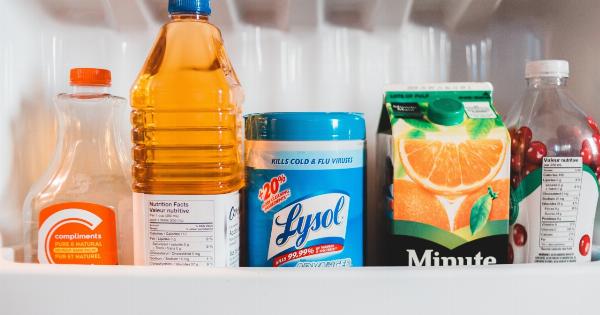Bacterial infections are a common problem worldwide, affecting millions of people every year. They can cause a range of symptoms from mild to severe, and in some cases, even be life-threatening.
Antibiotics have been a go-to solution for treating bacterial infections, but the overuse of antibiotics has led to the development of antibiotic-resistant bacteria, making it increasingly difficult to combat bacterial infections. However, there is a miracle fruit that has shown immense potential in fighting bacterial infections – the cranberry.
What are Cranberries?
Cranberries are small, round, bright red, and tart berries. They grow on evergreen shrubs that belong to the Ericaceae family, which also includes blueberries, huckleberries, and lingonberries.
They are native to North America and were mostly used by Native American tribes as a source of food, medicine, and dye.
Cranberries and Bacterial Infections
Cranberries are rich in nutrients, antioxidants, and phytochemicals that can help in fighting bacterial infections.
Studies have shown that cranberries have compounds that prevent the adhesion of certain bacteria to the urinary tract, reducing the risk of urinary tract infections. The compounds in cranberries not only prevent bacteria from sticking to the bladder and urethra walls, but they can also help flush out the bacteria from the body.
Bacterial infections can occur not just in the urinary tract, but in various parts of the body.
Cranberries have also shown potential in preventing and treating bacterial infections in other parts of the body such as the mouth, stomach, and respiratory system.
How do Cranberries Fight Bacterial Infections?
The compounds found in cranberries prevent bacteria from sticking to the body’s cells lining, making it difficult for the bacteria to multiply and cause an infection.
The compounds also have an antimicrobial effect that helps kill the bacteria, stopping the infection from spreading further.
Cranberry Products to Combat Bacterial Infections
There are various cranberry products available that can help fight bacterial infections. Some of these products include:.
- Cranberry Juice
- Cranberry Concentrate
- Cranberry Supplements
- Cranberry Extracts
Consuming these products can help prevent and treat bacterial infections, although it is essential to follow the proper dosage instructions.
Precautions
Cranberries have a lot of health benefits, but it is essential to consume them in moderation. Overconsumption of cranberry products can lead to stomach upset, diarrhea, and other digestive problems.
Cranberries may also interact with certain medications, such as blood thinners. It is necessary to consult a healthcare provider before consuming cranberry products, especially if you are on medication.
Cranberry Products and UTIs
Urinary tract infections (UTIs) are one of the most common bacterial infections, affecting women more than men. UTIs can cause pain, burning sensation, and discomfort during urination.
Cranberry products have shown significant potential in preventing and treating UTIs.
Cranberries contain compounds called proanthocyanidins (PACs) that can inhibit the adhesion of bacteria to the urinary tract walls and prevent them from multiplying.
PACs can also help change the pH of the urine, making it more acidic and unfavorable for bacterial growth.
A study published in the American Journal of Obstetrics and Gynecology in 2012 found that women who consumed cranberry juice or cranberry supplements had a reduced risk of UTIs compared to those who did not consume cranberry products.
Another study published in the Journal of Antimicrobial Chemotherapy in 2009 found that cranberry extract could significantly reduce the risk of recurrent UTIs in women.
Cranberry Products and Dental Health
Oral bacterial infections such as gingivitis and periodontitis affect millions of people worldwide. If left untreated, these infections can lead to tooth loss and other serious health issues.
Cranberry products have shown potential in improving dental health as well.
Cranberries contain polyphenols that can interfere with the bacteria’s ability to form dental plaque, the leading cause of dental decay.
The polyphenols also have an anti-inflammatory effect that can help reduce gum inflammation caused by bacterial infections.
A study published in the Journal of Biomedicine and Biotechnology in 2012 found that cranberry extract reduced the growth of oral bacteria and improved periodontal health.
Another study published in the Journal of American Dental Association in 2008 found that a mouthwash containing cranberry extract reduced plaque formation and gum inflammation in patients with chronic periodontitis.
Cranberry Products and Respiratory Infections
Respiratory infections such as pneumonia and bronchitis affect millions of people worldwide, leading to hospitalization and even death in severe cases. Cranberry products have shown potential in preventing and treating respiratory infections as well.
Cranberries contain compounds that can reduce inflammation and oxidative stress, both of which play a significant role in respiratory infections.
The compounds in cranberries can also prevent bacteria from sticking to the respiratory tract walls, reducing the risk of infections.
A study published in the Journal of Nutrition and Metabolism in 2013 found that cranberry extract reduced inflammation and oxidative stress in patients with bronchial asthma.
Another study published in the Journal of Food Science in 2014 found that cranberry extract could inhibit the growth of respiratory bacteria, including Streptococcus pneumoniae and Haemophilus influenzae.
Conclusion
Cranberries are a miracle fruit that offers plenty of health benefits, especially in fighting bacterial infections.
The compounds in cranberries prevent bacteria from sticking to the body’s cells lining, making it difficult for the bacteria to cause an infection. Cranberries have shown potential in preventing and treating bacterial infections in various parts of the body, including the urinary tract, mouth, stomach, and respiratory system.
However, it is essential to consume cranberry products in moderation and consult a healthcare provider before consuming them, especially if you are on medication.




























